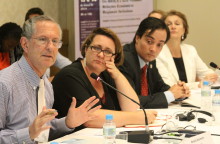Workshop on Inclusive Regional Economic Relations
Archive Economic Policy Forum


On March 13-14, the Economic Policy Forum met in Rio de Janeiro to formally launch its third Policy Initiative around issues of regional economic integration. The workshop was hosted by the Instituto de Pesquisa Econômica Aplicada (Ipea), and supported by the Fundação Getulio Vargas (FGV) and the Deutsche Gesellschaft für Internationale Zusammenarbeit (GIZ).
Senior experts and policy analysts from Chile, Brazil, India, China, Nigeria, Mexico, Russia, South Africa and the European Union gathered in a roundtable to outline concrete strands for future joint research. In a focused discussion, they analysed the domestic approaches to economic integration in their respective regions as well as among BRICS, the trade-offs and benefits of bilateral and multilateral trade agreements that are currently under negotiation, as well as the prospects for strong local trading currencies to hedge against global financial volatilities.
Participants agreed to deepen joint research and develop concrete policy recommendations in three priority areas, under the coordination and guidance of the South African Institute for International Affairs (SAIIA), the Observer Research Foundation (ORF) and the Instituto de Pesquisa Econômica Aplicada (Ipea) respectively. As a first priority, EPF members will jointly develop new domestic strategies to drive regional integration, specifically also with a view to the role of state-owned enterprises and the private sector. Secondly, they will aim to jointly formulate more effective responses to changes in the international trade and investment landscape. And thirdly, new veins for a fruitful South-South Cooperation will be created under the EPF framework.
The EPF workshop took place in the run-up to the BRICS Academic Forum, which is convened by the BRICS Think Tank Council to engage in track-II exchanges on important topics of the official intra-BRICS dialogue. The BRICS Think Tank Council invited EPF to submit concrete proposals for collaboration, and welcomed the engagement of its members with the EPF network to strengthen future ties.


